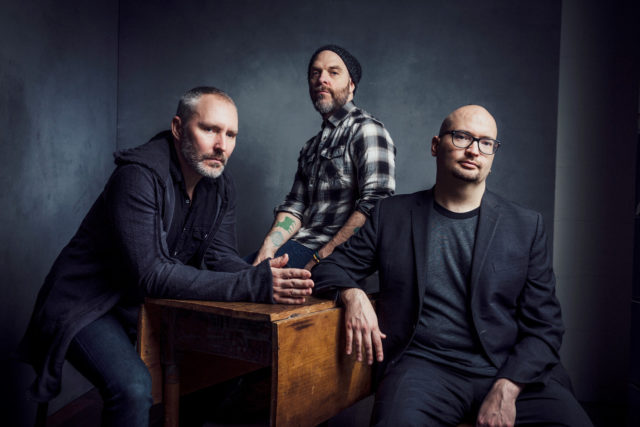
People from around the world know the Curtis Institute of Music is highly selective. With just a 4.8 percent admission rate, Curtis only grants admission to the number of students necessary to fill a single orchestra and opera company. By all accounts, Reid Anderson, bass player of the jazz acoustic trio The Bad Plus, shouldn’t have been one of them.
“Let’s just say it’s unusual to have only been playing your instrument for only one year and get in to Curtis,” says the Minnesotan turned New Yorker with a humble chuckle.
Ready or not, the young Anderson was soon immersed in an academic study of classical music. His lessons came according to the school’s value of “doing,” and his potential was molded into adeptness as he played. But with his place among the elite of the music world all but guaranteed, he found himself doubting the sureness of his path.
“My god! What have I done? What have I gotten myself into? I really don’t want to be a classical musician,” he says he thought to himself. “I want to play jazz.”
From among the rows of virtuosos all playing their proper roles, Anderson had uncovered an undying zest for free creative expression. As soon as he graduated from Curtis, his living became a musical process, one that he refers to as “the search.”
“I like to be surprised,” he says. “For me, there always has to be some level of mystery in what I am doing in order to keep and compel my interest. It lies in the depths that you can’t quite see or in the magical process of writing music where you will suddenly be like, ‘Where did that come from?’
“You’re wondering because it wasn’t derived and it didn’t come from some kind of formula or an established way to get there. All of a sudden you just have this music coming out and you say…” he stops, abruptly, presumably looking for a word big enough to sum up all that he loves about jazz.
“Wow,” he finally says.
For 17 years now, The Bad Plus has been the jazzy manifestation of “the search,” which is to say it’s been a long term investment in collaborative seeking.
“The Bad Plus is the sound that happens when these three people get together,” he says. “What we do requires the committed energy of this specific trio performing and playing music that we have played for all of these years, over and over, and with the kind of musical communication that exists between us, that has always existed between us.”
You have to take Anderson’s comment in the context of the jazz world, where it’s rare to have a committed group able to last for four or five years, let alone 17. It’s just a part of the culture to have wandering players, lending a physical spontaneity the genre depends on. But The Bad Plus forfeited this formula for randomness in favor of a unique and developed sound you can “really sink your teeth into.”
While the band’s tenet of group music and sound held them together like glue, it was also, always, full of the potential to tear them apart. Ebbing levels of commitment to the band caused not just fissures, but fractures that cut deep. As a result, the last few years have been full of harried tensions within the trio.
And so pianoman Ethan Iverson is on his way out. With his last show scheduled for New Year’s Eve, The Bad Plus is welcoming Orrin Evans, who will not only step into Iverson’s role but also bring his own style, inevitably transforming the long-established sound of the band.
Anderson isn’t interested in lingering on the transition; suffice it to say he thinks Evans an “obvious and natural fit” and that yes, the sound will inevitably evolve thanks to his influence. But while The Bad Plus may be rigid in its commitment to group music, there’s still room in the ethos for individuality and personal expression.
All the guys have their own projects and they have always served to lift their collaborative effort. Take Anderson, for example, who has taken to working long hours in his home electronic studio, surrounded by analog synthesizers, old samplers, drum machines and sequencers. A lifelong fan of electronic music and now a practitioner himself, he says it is only a matter of time before he releases his solo work to the world.
“As ubiquitous as it now is, there is a lot of potential in electronic music,” he says. “It’s like jazz in that it allows me to make some music without knowing where it comes from in a way that really surprises me and takes me somewhere new. But it’s also a different process and I like that. I like being able to explore another side of myself.”
Where and how Anderson plays may take a variety of forms, but whatever he does is always somehow in service to The Bad Plus, the obra maestra of which he is a humble part, sharpening his skills for the sake of the trio, despite its changing lineup and evolving sound.
No matter how understandable or timely, transitions are rarely easy, but in this case it’s probably best to be like jazz and let the discordance happen, without interrogation, appreciating it instead for the new inroads being laid for continued exploration.
On the Bill: The Bad Plus. 8 p.m. Wednesday, Nov. 1, Boulder Theater, 2032 14th St., Boulder. Tickets and information: 303-786-7030.














